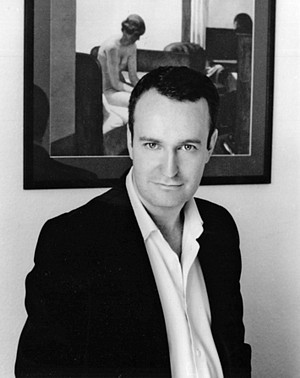By Christian Lorentzen
The New York Sun
May 30, 2007
http://www.nysun.com/article/55512
The crux of Andrew O'Hagan's third novel, "Be Near Me" (Harcourt, 305 pages, $24), is a night of wandering and carousing that ends with a kiss and a reproof. The episode would be negligible in most lives, but the parties concerned happen to be a 15-year-old boy and a 56-year-old Catholic priest. They are discovered just after dawn, drunk, high, and holding hands on the rectory couch, by the housekeeper. The incident creeps to the attention of the authorities, leading to the pastor's arrest and electrifying political and class resentments in the county of Ayrshire on the west coast of Scotland. Headlines in the local tabloids name Father David Anderton "The Face of Evil," and an angry mob sets fire to the rectory, yelling, "Come out, ya child molestin' bastard."
But it is with indifference, rather than terror or guilt, that Anderton, the eloquently reticent narrator of "Be Near Me," greets the hysteria his lapse ignites. Notions of sin have less claim on this pastor's attentions than his connoisseurship of wine, classical music, and the memories awakened by his encounter with the boy, "a very different version of the person my life had allowed me to be …. a fine-looking, restless young man, who had answered the call of a moment and the sad old ghosts of self-love." Anderton's is the Christian faith of the aesthete that underlies the late poetry of W.H. Auden and made a deathbed convert to Catholicism of Oscar Wilde. As the priest relates, "My childhood gave me a strong sense of unreality, of stories and myths being better than facts. I suppose this made me a natural Catholic but a less than natural person."
 |
|
Andrew O'Hagan, author of "Be Near Me. O'Hagan is mostly concerned with human frailty, a problem at once moral, aesthetic, and metaphysical, writes Christian Lorentzen. Photo by Jerry Bauer |
The "ghosts of self-love" draw Anderton into reminiscences of his parents, a Scottish novelist mother and an English surgeon father; his shipping off to a Catholic public school, Ampleforth, after his father's death, and his uncompleted undergraduate education at Oxford. Ampleforth is recalled as a "paradise," "a merciful place," "a heaven spotted with frailty," contrary to recent accusations of abuse. "I would never," says Anderton, "seek to excuse the hurts that lonely men are sometimes known to enact upon their juniors."
Just what constitutes a "hurt" is a question at the core of this intricate and finally ambiguous novel. Mark McNulty, nicknamed "McNuggets," the youth whose family has brought the charge of sexual assault upon Anderton, seems, even by his own account, undamaged by the night in question. More is at stake for McNulty's father, an obese depressive, years unemployed, who in the manner of a human battering ram leads the mob that attacks the rectory. The angry Scottish-Irish horde he rallies finds in its suspiciously sophisticated and English pastor a scapegoat for its own dispossession.
The locals' grievances, however, could not differ further from the wound Anderton nurses. Like Humbert Humbert in "Lolita," he is attracted to Mark because he has not relinquished the memory of a lover ripped from his arms by fate. This is Conor, an Oxford classmate who taught Anderton "how glorious it might be to live in colour for the first time." Whereas Nabokov's Humbert is a portrait of calculated perversion, Anderton is a lesson in the tendency of character to warp under the pressure of decades of restraint.
Oxford is the locus of the novel's best-realized passages. Entering Balliol College, Anderton falls in among the Marcellists, a band of boys who can cite Proust chapter and verse and revere the ghosts of the Oxfordians lost in the Great War. He finds Conor among "the radicals and associated worshippers of Mao and haters of Lyndon Johnson known as the Bombastics." Conor initiates Anderton into the protest culture of 1968 but soon, with "the bad grace to lose his life at a moment of unimpeachable promise," dies in a car accident on his way home from a protest. In his absence, Anderton retreats into the life of the cloth.
The political, in "Be Near Me," is intimately personal, as these events are recalled from the perspective of 2003, during the start of the current Iraq war, and the novel's many discussions of that war are set up in contrast to the politics of the late 1960s. Over dinner with fellow clergy, Anderton expresses the views of a liberal hawk. As the priest befriends Mark and his girlfriend, Lisa, he listens to Mark's slang-inflected Islamophobia and rowdy invocations against Saddam Hussein. The ardor of these pronouncements link Mark in Anderton's mind to Conor and his own younger self …amp;quot; one of Mr. O'Hagan's clever inversions. The narrator's last run-in with the teenager, who has enlisted in the Army, leaves the sense that Mark's passion too will lead him to an early doom.
For all the death and, mostly repressed, sex that loom over this novel, "Be Near Me" is generously strewn with gentle ironies and not without moments of outright comedy, as when Anderton's housekeeper quotes Robert Burns in his defense at trial. And despite the topicality he indulges in …amp;quot; Iraq and Vietnam; Catholicism and child abuse; ethnicity and class; not to mention cancer and environmentalism …amp;quot; Mr. O'Hagan is mostly concerned with human frailty, a problem at once moral, aesthetic, and metaphysical. As a convicted Anderton reflects, "Our journey will sustain many falsehoods to avoid that one truth: we wanted love, and without it only the broad universe would do, with its solid, perfumed dark."
Mr. Lorentzen, an editor at Harper's Magazine, last wrote for these pages on the novelist Jim Crace.
Any original material on these pages is copyright © BishopAccountability.org 2004. Reproduce freely with attribution.